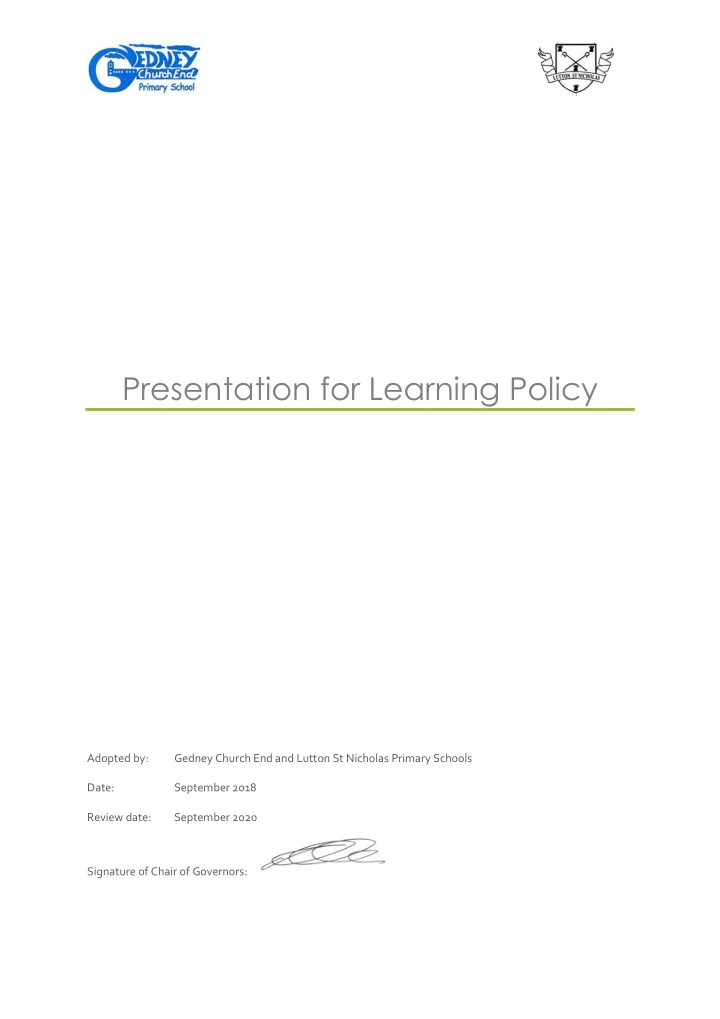

Presentation for Learning Policy Adopted by: Gedney Church End and Lutton St Nicholas Primary Schools Date: September 2018 Review date: September 2020 Signature of Chair of Governors:
Aims and objectives At Gedney Church End and Lutton St Nicholas Primary Schools we are always seeking to raise standards in all aspects of teaching and learning. Our school s’ ethos is one of pride in learning and the presentation of pupil outcomes in books forms a core part of this ethos. Pupil books form a record of the learning that has taken place during an academic year and must reflect a progression of personalised learning opportunities, as well as evidence of pupils making effort and taking pride in their outcomes. These must show clear progress over time. Across all year groups, we believe that: Presentation needs to be modelled so that all pupils can achieve success: This includes page layout of date and title Systematic recording methods, including one digit in one square An expectation of neat and presentable handwriting by all-child and teacher. The school’s handwriting script must be followed by all. Teachers will mark in purple pen (not felt tip), supplied by the school. Pupils will be included in demonstrating good practice and celebrated for the effort to progress and improve Differentiation is expected across year groups and for individuals. Having agreed this policy, we will all monitor standards closely, including: The presentation policy being a part of all book scrutinies within the monitoring cycle Children’s efforts being celebrated Graffiti, doodles or scribbles on books will not be tolerated. Across all year groups, we believe that all children: Regularly read and respond in a green pen (supplied by the school) to the comments made by adults in their books. Take pride and care in the presentation of their books reflecting the high standard that is expected Underline titles using a ruler and pencil and never leave unnecessary gaps Take time to correct and finish off work where appropriate Cross out mistakes with one line using a pencil / pen and ruler Not to use felt tip pens to present work in books or on display Use quality writing equipment appropriate to the Year Group, consistently using either pen or pencil as appropriate to the task that has been set. Only school pens are to be used by pupils. Use pencil for drawings or diagrams Pupils should be expected to record the learning objective and full date at the beginning of each piece of recorded learning. Children who are in Year Two and below will have a sticker to show this. Erasers will be discouraged. Errors can be crossed out with one horizontal line using a ruler and pencil. However, teachers and support staff can use discretion when they feel it would enhance the quality of work or motivate the pupil to make greater progress. All writing and stationary equipment will be provided by the school. In Key Stage One When writing the date, we: Date all work with along date for Literacy, Science and Topic. The short date is used for maths Place dates/stickers in the left hand corner of the page
. When writing the titles, we: Write a short and child friendly ‘Learning Objective’ as the title Have computer generated titles. Always begin with ‘L.O:’ We always use a sharp pencil in books although other writing materials are available for writing tables and writing activities. All books have labels and book covers, essential points to include are: Pre-prepared labels are to be used for all books Labels show the child’s full name, subject and class name. These are prepared on the computer and never handwritten. Pupils who are new to the school have books organised by the class teacher Writing Scaffolds can enhance a lesson, useful points to consider include: Pre-cut worksheets so that they fit on the page; Teach the pupils to stick these in where possible, otherwise by support; Where a child is absent from their learning, a note is to be made in their books. In Key Stage Two When writing the date, we: Date all mathematics work with a hand written short date When numbering questions, work down the page, leaving a space between the question number and the beginning of the learning. Date all literacy based work with a handwritten long date Place dates in the left hand corner of the page Underline the date with a pencil (see below) and ruler Miss a line after the date Differentiation can include Key Stage One variations. When writing the titles, we: Write a short and child friendly ‘Learning Objective’ as the title Always begin with “L.O:” Underline the title with a pencil and ruler We miss a line after the title Differentiation can include Key Stage One variations. Pencils / Pens are used: All pupils in Year 6 and the majority of Year 5 use blue pens supplied by the school. From Year 3 onwards, pupils can receive pens when their handwriting achieves the required standard. The pen will be presented to the child having demonstrated the appropriate level and skill. Pens, when used, should only be used in writing and topic books. All drawings and diagrams should be in pencil. All books should have printed labels showing the child’s name, subject an d class name. When writing scaffolds are used they need to be pre-cut so that they fit on the page and stuck in the books. Where a child is absent from their learning, a note is to be made in their books.
In EFYS Pupils are taught to take pride in their written outcomes and use a variety of methods to develop fine motor control. It is expected that by the end of EYFS all children will be able to manipulate a pencil to write their own name with a capital letter and key words in a simple sentence, take pride in their outcomes and understand that scribbling on work is not encouraged.
Recommend
More recommend